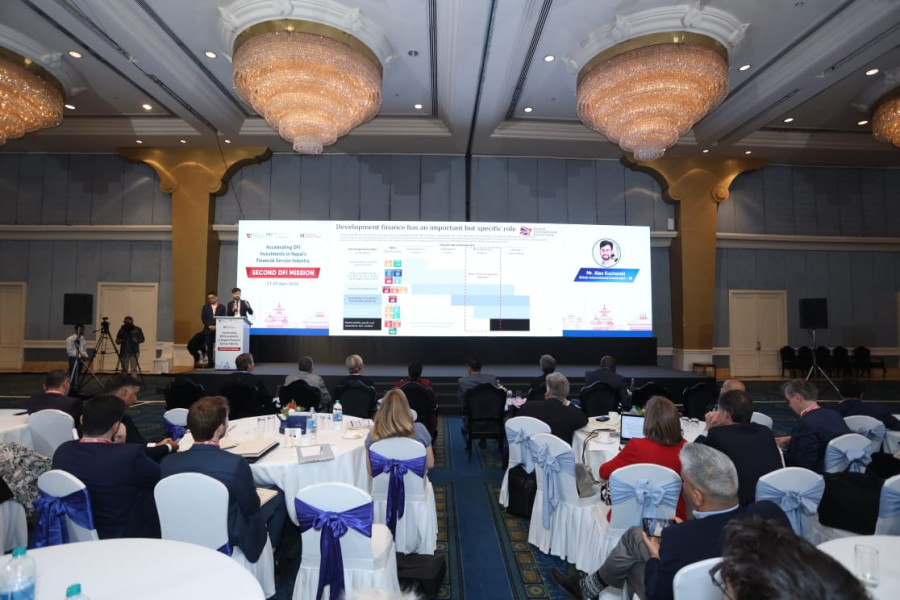Money
Investment from DFIs crucial for Nepal’s graduation
Structural issues, regulatory ambiguities and political uncertainty have prevented big foreign investment in Nepal, says British envoy.
Krishana Prasain
The investment from development finance institutions (DFIs) is crucial for Nepal as it stands at a critical juncture to graduate from the least developing countries (LDCs) category by 2026, experts and participants at a function said on Tuesday.
DFIs are specialised foreign government-backed institutions that invest in commercially feasible private-sector projects in low- and middle-income countries where projects face financing gaps and are unserved by private banks.
Overall, between 2014 and 2023, DFI investments reached around $1.09 billion, most absorbed by the energy sector.
On Tuesday, Invest for Impact Nepal, a platform to support foreign direct investment into Nepal, powered by British International Investment (BII), the Dutch Entrepreneurial Development Bank (FMO) and the Swiss Agency for Development and Cooperation Nepal (SDC), organised the second edition of the DFI mission to promote private investment in Nepal.
The three-day event is seeing participation of as many as 30 delegates from 14 institutions.
Danielle Meuwly, the ambassador of Switzerland to Nepal, speaking during the inaugural session, said that during the 60 years of partnership between Nepal and Switzerland, both countries have made several important milestones and the second DFI mission is one of them, building on the outcomes of first DFI mission organised in the spring of 2023.
“During the first mission of the DFI, we had the opportunity to meet the Ministry of Finance, Nepal Rastra Bank and the Security Exchange Board of Nepal,” Meuwly said. “We had the opportunity to discuss the concerns jointly and suggested some ideas to the government,” she added.
“Now, a year later, many of these recommendations have been acknowledged and steps were taken to address issues like locking investment, payment before disbursement and decomposing interest rate. This shows that the government has a strong commitment to facilitating DFI investment in Nepal,” Meuwly said.
To achieve sustainable and inclusive growth, it will be important that the government and private sector work together to jointly increase investment and strengthen the partnership with DFIs, she said. “And this is why Switzerland supports Invest in Nepal Impact.”
Switzerland joined hands with British International Investment and the Dutch Entrepreneurial Development Bank FMO with a vision to unlock DFI investment and nurture Nepal’s investment ecosystem, Meuwly said.
“At present Nepal needs investment support to generate employment,” said Finance Secretary Madhu Kumar Marasini. “We should transform our system and bring more investment, especially from the private sector and DFIs. “Bringing investment from DFIs helps to bring in technology, knowledge and expertise besides money,” he said.
He said that the private sector's contribution to the country’s GDP is 80 percent and more than 86 percent of employment is generated by the private sector. “So investment needs to be facilitated by creating a conducive environment,” Marasini said.
The government has decided to amend nine laws related to investment through an ordinance as Nepal has planned a third investment summit next week.
Rabi Rayamajhi, the country representative of the BII Nepal, said that in the last 15 years, investment commitment from DFIs has been growing in Nepal.
The DFI investment commitment in 2023 was $300.75 million.
“The number of DFI investment commitments has spiked after 2018 as that year the government opened up the external commercial borrowing window, which allowed the foreign lender [BII] to come and engage with Nepali banks.”
According to Rayamajhi, about 59 percent of DFI commitments have come into financial services, 28 percent in energy, 10 percent in the funds and the rest in other sectors, Rayamajhi said.
In terms of product, 84 percent has been invested as debt in hydropower projects or banks, 15 percent in equity, and some DFIs are bringing guarantee instruments as well, he added.
“DFI commitment in Nepal stands for two reasons, one, it is sizable. Compared to the last 15 years of commitment from the Department of Industry that are looking at small-scale investments, DFI investment to date is one-third of it,” Rayamajhi said.
“Second, the conversion rate of commitments in Nepal is roughly around 30-40 percent from the general investment but the commitment from the DFI is almost 100 percent materialized. That’s the difference in quality investments,” Rayamajhi said.
The top five investors in Nepal by commitment in the last 15 years are the International Finance Corporation (IFC), the Development Finance Corporation (DFC), BII, the Dutch Entrepreneurial Development Bank, FMO and the Asian Development Bank.
“There are deep-rooted structural issues, legal and regulatory ambiguities and political uncertainty in Nepal, which has been preventing the flow of large amounts of investments into Nepal,” said Rob Fenn, British ambassador to Nepal. “Removing those hurdles requires a policy change.”
“There are attractive investment opportunities across several sectors in this country. Together DFIs and development partners can unlock the access to finance for those strategic sectors.” “Our task is to create a pipeline of investment deals to DFIs in Nepal and development partners can help bridge the massive gap between supply and demand for investment here,” Fenn said.




 9.12°C Kathmandu
9.12°C Kathmandu














